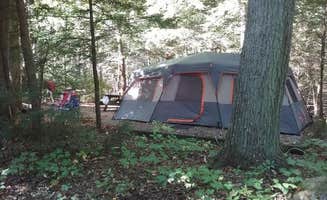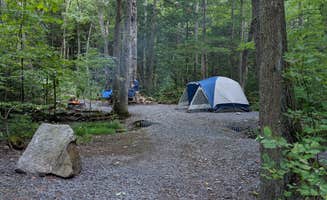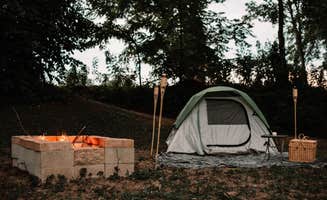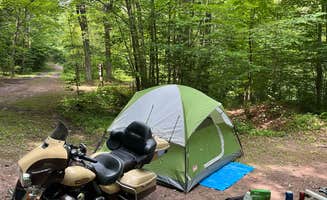Tent camping opportunities near Watsontown, Pennsylvania extend throughout several state forests and parks spanning the region. The area features elevations ranging from 500 to 2,100 feet with mixed hardwood forests dominated by oak, maple, and pine trees. Summer temperatures typically range between 60-85°F, while spring and fall camping seasons experience significant temperature variations between day and night.
What to do
Creek exploration: At Ravensburg State Park Campground, several hiking trails follow the water with swimming holes. "There are few hiking trails; short and long that take you to beautiful views along the creek with a couple of places deep enough to swim," notes camper Laura.
Geocaching opportunities: The area surrounding Reeds Gap State Park offers geocaching activities accessible from trail heads. As one visitor explains, "There is a trail head near the entrance of the park for hikers and a geocache showed up close to the trail on a road on my geocache tracker if you are into that."
Digital detox: The parks provide a natural technology break due to limited connectivity. A Reeds Gap camper advises, "Put your phone away cuz there's no cell service here! Nice and peaceful with a dozen or so tent only sites."
What campers like
Secluded sites: The camping areas at Shikellamy State Park offer scenic overlooks and cliff-side pavilions. One visitor shared, "Had a great time walking the trails and enjoying a picnic at the cliff-side pavilion."
Hammock-friendly locations: Creekside sites at Ravensburg State Park provide perfect hammock setups. A camper notes, "There are plenty of trees that are good for hammocking. And in a few sites, you can set them up right by the creek, which is my favorite part."
Self-registration systems: Most state forest camping areas use honor-based registration. At Reeds Gap, a visitor explained, "Stayed here on a Sunday night without a reservation. We were the only ones there. Pay by honor system at the park office."
What you should know
Navigation challenges: GPS directions to several parks can be unreliable. A Ravensburg visitor warned, "Use lat and long coordinates for directions or you will be in the wrong spot," while another noted, "Park is easily accessible from I-80, just be aware of your directions and make sure they're taking you to the park via Rocky Road."
Road noise varies: Some campsites are positioned near roadways. At Tiadaghton State Forest sites, distance from roads varies, while at Reeds Gap, a camper mentioned, "We got a nice one tucked back in the trees, but a few of them are pretty close to the road - not like it's terribly busy."
Water sound levels: Stream noise can be significant at water-adjacent sites. One Ravensburg camper noted, "If you camp on the sites by the river, be prepared for lots of noise from the rapids. It had been raining quite heavily all day, so this may have impacted the volume levels."
Tips for camping with families
Playground access: Families seeking the best tent camping near Watsontown, Pennsylvania should consider Reeds Gap State Park Campground for its recreational facilities. A visitor mentioned, "There's a nice creek that runs through it, picnic pavilions and a playground for the kids!"
Site selection strategy: Request sites away from road traffic for safer family camping. At Reeds Gap, a camper advised, "We got a nice one tucked back in the trees, but a few of them are pretty close to the road."
Bathroom proximity: Check campsite maps for bathroom distances when camping with children. A Reeds Gap visitor noted, "Bathhouses were a little far away," which can be challenging for families with young children.
Tips from RVers
Small RV recommendation: Most tent camping areas near Watsontown accommodate only compact RVs under 25 feet. Larger vehicles may find limited suitable sites at Eastville Roadside Campsites in Bald Eagle State Forest.
Leveling requirements: Many sites require significant leveling due to the region's rolling terrain. Bring extra leveling blocks as most tent-focused campgrounds have natural, ungraded surfaces.
Limited hookups: Most state forest sites offer no water or electrical connections. Campers must be self-contained with sufficient water storage and power generation capabilities for their stay.





